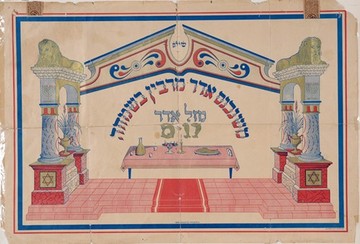An inspection of the passage in the Talmud reveals that the rabbis weren't really talking about the joy of Purim. Rather, they were talking about the misery of a different holy day—Tisha B'Av, the darkest day of the Jewish year, the day that marks the destruction of the Temple in Jerusalem.
After a long discussion that details all of the woes of Tisha B'Av, the Ninth Day of Av, the rabbis state, "When Av enters, joy decreases." It is only as an apparent afterthought that "Rav Yehudah, the son of Rav Shmuel bar Shilat said in the name of Rav, 'Just as when Av enters, we decrease joy, thus when Adar enters we increase joy.'"
This statement is immediately followed by a comment about luck. The mazal (luck) is better in Adar than it is in Av. Adar is a much better time for you to enter risky endeavors, says the Talmud, "to give you a future and a hope" (Jeremiah 29:11).
Now, once the Talmud gets rolling with biblical quotations, it just cannot help itself from continuing with the interpretations. I won't go into all of the details, but the Talmud then goes on to compare the phrase "future and hope" to the values of living a simple, pastoral life. Hopefulness is the product of living with the smell of apple orchards in your nose and the feel of durable work clothes on your back. Av is associated with the destruction of cities. Adar is associated with the simple joys of living off the land.
This is a much different idea of the joy of Adar than what we usually think. When we think of Adar, we think of the silliness and over-the-top merriment of Purim. The quote from the Talmud that associates Adar with joy, though, has a different image in mind. It is the joy of the worker in the field, far away from the hustle, bustle and squabbling of the city. It is not the joy of drunken revelry. It is the joy of having a future and a hope.
We are entering springtime, or at least (depending on your latitude) we are entering the first whispers of spring in our ears. It is a time for renewing our sense of hope for warm days and plentiful harvests to come. It is the season of the deep joy of satisfaction, the season of cycles that renew themselves without our help or intervention. When Adar enters, we increase in joy. We increase in our sense of wellbeing in the world and the sense that, through simplicity, we discover the things that matter most in life.
Rosh chodesh tov! May you have a good month of Adar!
Other Posts on This Topic:
Joy and Obligation


 RSS Feed
RSS Feed
